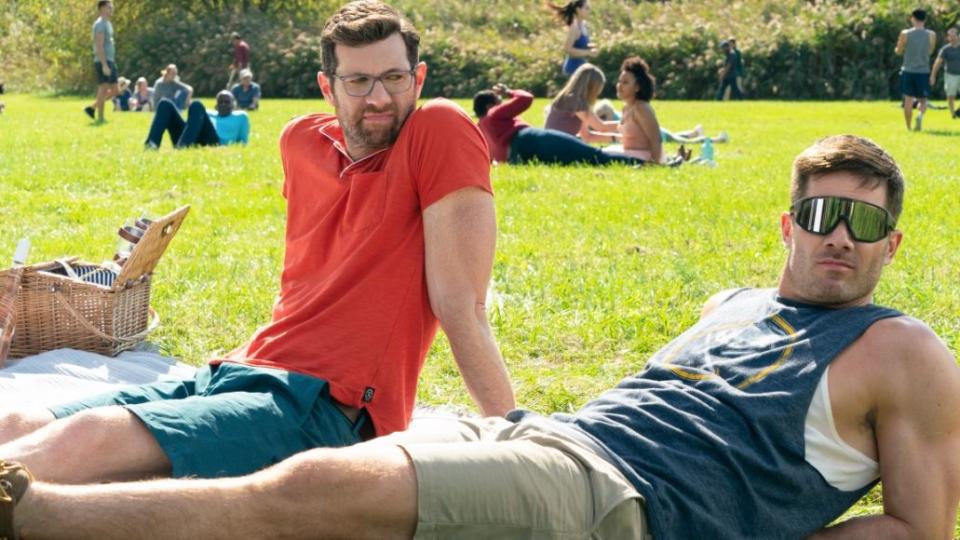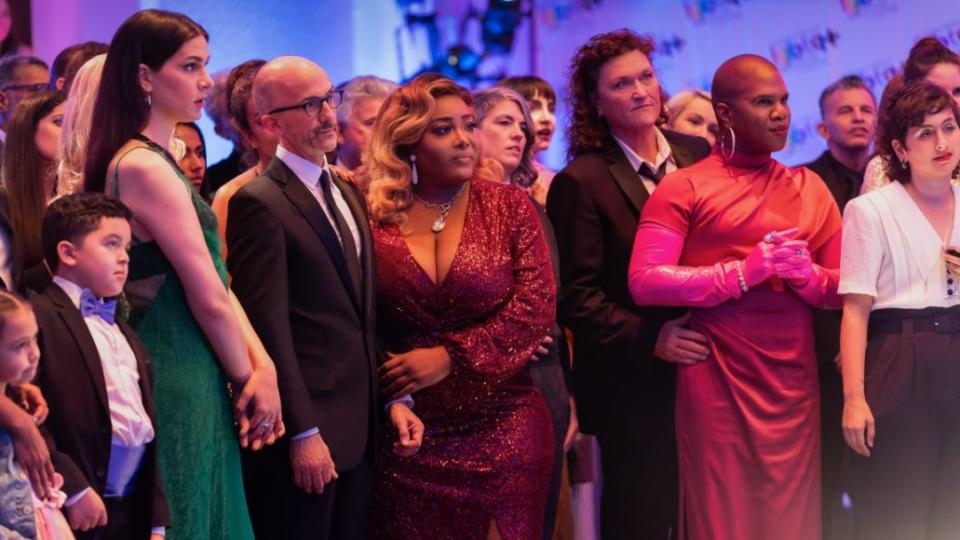Bros Refuses to Apologize For The Specifics of Queer Romance (Except When It Does): Review
- Oops!Something went wrong.Please try again later.
The post Bros Refuses to Apologize For The Specifics of Queer Romance (Except When It Does): Review appeared first on Consequence.
The Pitch: Bobby Lieber (Billy Eichner) is a successful pillar of the gay community in New York City: He’s got a popular podcast, he’s the director of what’s soon to be the nation’s first LGBTQ+ history museum, and he was just named “Cis White Gay Man of the Year.” The only thing missing is a man in his life, but Bobby isn’t into all that: “Love is not love,” he stresses early on to his friends, rejecting the oft-used gay rights sentiment as a lie to get straight people to treat queer folks like human beings. Instead, he chips away at one awkward Grindr hookup after another.
But fortune changes when Bobby runs into hunky estate lawyer Aaron (Luke Macfarlane) at a club; they each clock the other as angry and boring, respectively, and their shared fatigue for the performative, image-conscious tropes of mainstream gay culture draw them together. Before long, the commitment-phobic pair find themselves navigating the usual messiness of the mismatched movie rom-com couple, awash in the rainbow colors of urban white queerdom. Can these two crazy kids make it? Let’s find out!
Difficult People: Bros carries a huge weight on its shoulders; it’s one of the first gay rom-coms to be released by a major studio (we’ll not brook any Fire Island erasure here, children), and the first to get a nationwide release in theaters. Naturally, stakeholders of many stripes are watching this project closely — if it succeeds, it could open the door for more stories with queer leads in multiplexes around the globe. If it fails, that particular experiment could end up back in the celluloid closet, only to be dragged back out when some enterprising soul wants to try again.
The best, and worst, thing about Bros is that it (and writer-star Eichner and co-writer/director Nicholas Stoller) is fully aware of this responsibility, and tries very, very hard to meet it. And the results are charming, accessible, and fairly specific to the queer community in a way that’s just sanitized enough for the straights to sit through. Still, its desperate desire to meet its straight audiences halfway, not to mention its frantic need to position itself as an Important Moment in Queer Herstory, shoots it in the foot at vital moments.
At its core, though, Bros remains a showcase for Eichner, who’s quickly become one of the most prominent faces in queer media thanks to shows like Parks and Recreation and Hulu’s Difficult People. His typically loud, caustic sense of humor is on full display here, albeit somewhat sanitized for an older Eichner who recognizes the shelf life of that kind of snark.

Bros (Universal Pictures)
It can grate at times, but it’s really not too far afield from the aloof superiority of Billy Crystal in When Harry Met Sally… — he’s unlikable, but that’s the point. One of the bigger points of contention in his and Aaron’s budding relationship is the latter’s constant discomfort around Bobby’s flamboyance, whether at gay events or around his visiting parents. Bobby’s Too Much a lot of the time, but Aaron is also Too Ashamed of his queerness (as noted by his butch demeanor, hyper-masc presentation, and the fact he turned away from a childhood dream of becoming a chocolatier because it was too femme).
That kind of crackling back and forth sells the film’s fundamental romance, as the defensive born-and-bred city gay and the masc4masc rural transplant bounce back and forth between their competing needs for comfort and visibility. Eichner and Macfarlane have a beautifully unexpected chemistry; the latter is a man of few words, which makes the points where he makes Bobby stop in his tracks feel all the more impactful.
Their romance is peppered with culture-specific gags (Bobby’s insecurity about not having a gym body, multiple jokes about being the odd man out in a four-way), but still largely follows the three-act structure of your typical Nora Ephron joint.
And it lands some of its mid-film stabs at poignance, including an incredible beachside monologue where Bobby laments how queer people must use confidence as a shield, and how he wished his parents could be alive to see the strides he’s taken as a queer person. Those moments feel the most like Eichner reflecting on his own position as a Gay of Influence, and the immense responsibilities he feels as a result.
“We Had AIDS. They Had Glee.”: It’s when Bros veers outside the nuances of Bobby and Aaron’s relationship and orients them within a broader sphere of queer advocacy and acceptance, that the experiment starts to stumble.
Bobby’s subplot about opening the queer museum consists largely of board room meetings with a gaggle of colleagues from every color of the LGBTQ+ rainbow, and Eichner has a reductive one-joke read for just about all of them. There’s the trans character who has no ideas beyond touchy-feely platitudes (“I see you, and I’m holding space for you”), the angry butch lesbian, the self-involved zoomer influencer, and the self-important bisexual (Jim Rash) whose only gag is mentioning that he’s bisexual at the drop of a hat.

Bros (Universal Pictures)
These gags, coupled with the earnest presentations of queer figures throughout history, hint at a film that wants to honor the queer ancestors that have come before us, and the rich culture we’ve built. But that’s also at odds with Eichner’s jaundiced view of mainstream gay culture — specifically, the commodification of it by an increasingly tolerant American mainstream that tears up over Schitt’s Creek and Netflix’s reboot of Queer Eye.
When the script prods at Bobby’s insecurities about this gulf, it can get interesting; he’s neurotic and self-hating enough that you can see how he projects that disdain against the other queer folk around him, who lack such scruples about appealing to a wider audience. He rolls his eyes at straight actors playing gay for awards-bait movies, or Hallmark’s decision to finally offer treacly love stories to queer people as soon as they realize they’re a viable demographic.
The Verdict: Bros is a film at war with itself, and the competing interests of the (admittedly) messy gay agenda. Like Eichner himself, the film wants to have its ass and eat it too; it’s a sorta-edgy Judd Apatow-produced rom-com along the lines of Bridesmaids that must, by necessity, chase the acceptance of mainstream audiences to succeed in the marketplace.
But in so doing, it sands off the edges of its own sense of specificity, which hampers its attempts to stand out on its own. Still, when it focuses on Eichner and Macfarlane, and the ever-complicated mores of queer masculinity, it stays charming and light on its feet. If it were a little less self-conscious about that homonormativity, it’d have a more cohesive identity, and be more of a slam dunk in the process.
Where’s It Playing? Bros texts ‘u up?’ and asks for hole pics in theaters September 30th. (DISCLAIMER: Do not take hole pics in the theater.)
Trailer:
Bros Refuses to Apologize For The Specifics of Queer Romance (Except When It Does): Review
Clint Worthington
Popular Posts

